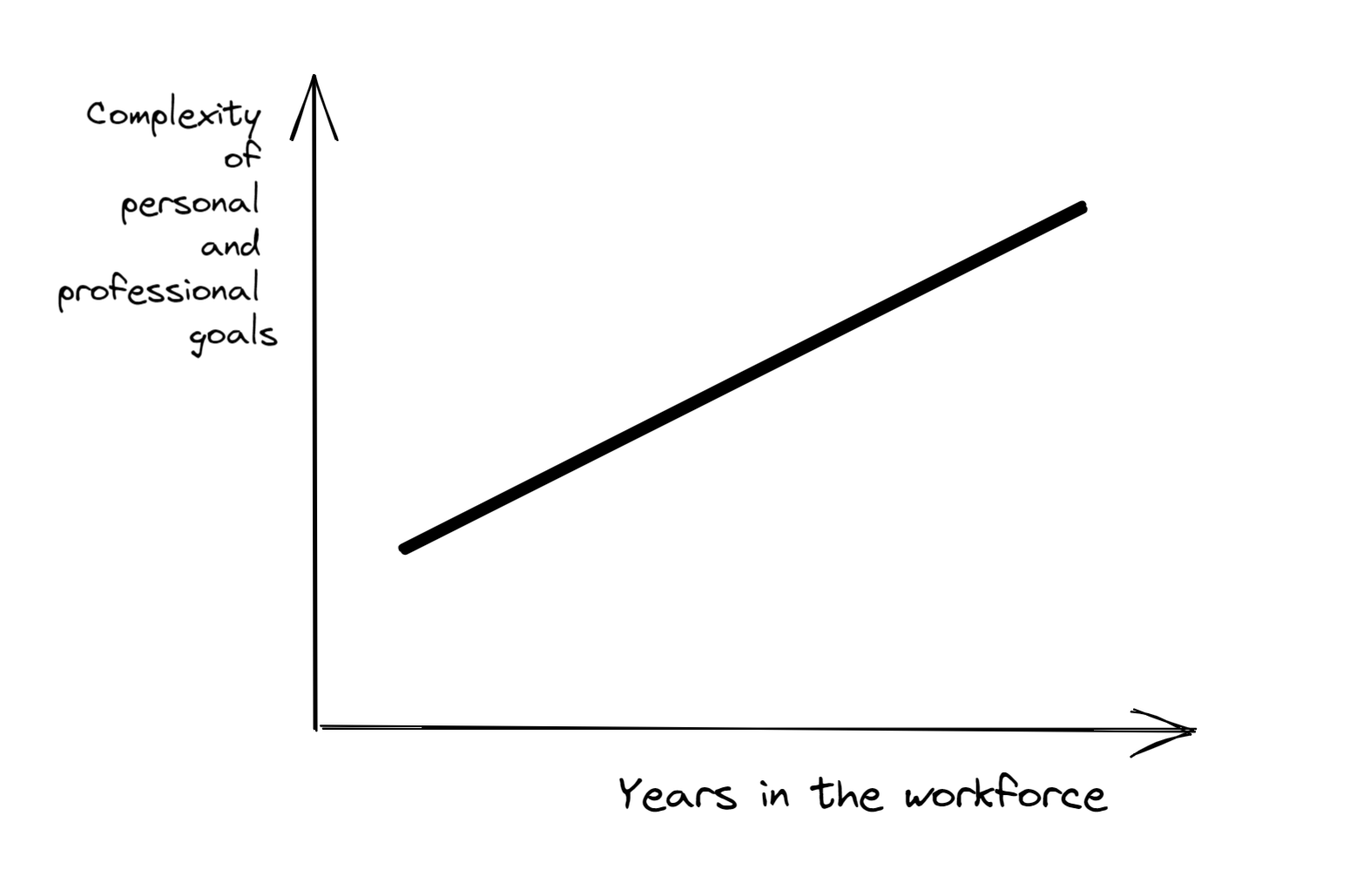on
The learning curve for long term goals
Over the past 2 years or so, (2021, 2022) I had this strange feeling I couldn’t shake off. It was a feeling that my relationship with my personal goals had changed, but not being able to identify what exactly had changed. I didn’t feel the same satisfaction as before from hitting goals, even if my goals had only gotten larger and more complex.
It’s taken a long time to adapt to this feeling, and I still feel that I don’t have an answer. But here are some reflections from my ongoing attempt at understanding.
Why does it feel like progress isn’t as fast as before?
To simplify the situation, my goals when I first started working were relatively simple: start saving, learn as much as possible, and so on. With each year, my goals have gotten more complex and difficult.
 Relationship between my years working and complexity of my goals.
Relationship between my years working and complexity of my goals.
Not being aware of this phenomenon led to dissatisfaction: Why’s it taking me so long to do X? How come it’s so difficult to do Y; in the past for a similar goal, I feel that it was easier.
Reflecting on those frustrations led me to understand the following points.
The more I know, the more I know I don’t know. For a work project, I used to think things were easier when I was entry level. At the time, I focused more on my own responsibilities as an IC (individual contributor). Code my thing, develop my model; now I can check this box off the list. Nowadays, I have to think on a much broader level, about other teams’ goals, and how my team’s work ties into the product and leadership’s goals. Compared to my objectives when I was entry level, things take longer to do due to the broader scope of influence. This broader scope also requires me to work with many more levers that aren’t my main expertise, and have to rely on others’ expertise. This makes me acutely aware of what I don’t know, and that I actually have much much more to learn.
There’s much less instant gratification. While I was entry level, I could quickly complete tasks. My main objectives were on a daily, weekly, or monthly horizon at most. Now, my main goals are roughly on a monthly or quarterly horizon, with some multi-quarter or multi-year efforts. Of course I do still have some daily to-dos, but completing those barely make a dent towards my main goals, and I feel less satisfied with just checking an item off my to-do list. This is an important thing to adjust to.
1 big thing, 2 medium things, 3 small things a day
Since my main goals have gotten larger, it’s been less satisfying to do a small coding task these days, or something that’s on a smaller time scale. This leads to dissatisfaction and boredom. How I’ve been making my day to day a bit more exciting is planning what I’m doing with the “123” rule. I think I read about this in blog or book a long time ago, but I can’t quite pinpoint the exact source. (I did find a source that calls it a “1-3-5” rule, similar concept.)
I’ll write down the one big thing I should work on today, for example, “outline PyCon slides in the evening”.
Then, I’ll put down 2 medium-length tasks, such as “code review”, “inventorize team tasks and update project board”.
I don’t count any scheduled meetings in this “123” list, since those are tasks that I will do anyway. The “123” list is best suited for things I might procrastinate, and obviously there are more than 6 things to do each day, so not all is captured here.
Lastly, there are 3 small things such as “load dishwasher”, “check insurance payment”, “pick up parcel”.
I like to use this list for personal items more than work items, but frequently include work items anyway. The reason is that at work, there are colleagues that I have to get back to, so I’m much less likely to procrastinate. When I’m not visiting my partner, personal tasks such as checking the mail and loading the dishwasher are easy to just do another day, which causes more headache down the road… (I proactively tidy up more when I’m living with my partner or family.)
Dealing with the uncertainty of long term planning
To tie everything together: many of my objectives these days take months or years of effort to come to fruition. This could lead to boredom or frustration during the day to day, since it’s harder to see how each of my daily efforts are contributing to the bigger picture.
I’m writing about my observations since I suspect other folks might have encountered this type of learning curve when their goals change.
Each week or month I take some time to think about my long term goals again, and see how much I’ve moved the needle. Sometimes, it’s not by much, but knowing that I’m still putting in effort slowly and steadily, gives me confidence that I will eventually achieve the results I want.